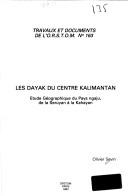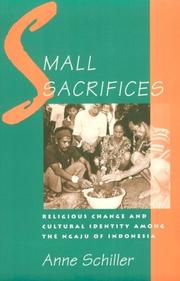| Listing 1 - 4 of 4 |
Sort by
|

ISBN: 2709907003 Year: 1983 Publisher: Paris : ORSTOM,
Abstract | Keywords | Export | Availability | Bookmark
 Loading...
Loading...Choose an application
- Reference Manager
- EndNote
- RefWorks (Direct export to RefWorks)
Ngaju (Indonesian people) --- Social conditions --- Economic conditions --- Social conditions. --- Economic conditions.
Book
ISBN: 9024719348 9004287108 9789004287105 9789024719341 Year: 1976 Publisher: Brill
Abstract | Keywords | Export | Availability | Bookmark
 Loading...
Loading...Choose an application
- Reference Manager
- EndNote
- RefWorks (Direct export to RefWorks)
The authors worked as doctors in Kalimantan between 1949 and 1959, where they were first introduced to Ngaju Dayak tales. The present anthology contains 20 tales given to them by the Rev. Munte Saha. Both the original text and the Dutch translation are provided. Ten of these are about Sangumang, the cunning one, who used to fool his uncle, the king. The other ten deal with Bapa Paloi, the stupid one, who is constantly being admonished by his wife. Sangumang and Bapa Paloi live in the upper-world, and mythological tales are told of their exploits. In addition to the 20 tales, a modern version of a Bapa Paloi tale is presented, written by the Rev. Munte Saha himself. The scene of this modern tale is not the upper-world but the present island of Kalimantan.
Tales --- Ngaju (Indonesian people) --- Biadju (Indonesian people) --- Ngadju (Indonesian people) --- Olo Ngadjoe (Indonesian people) --- Dayak (Bornean people) --- Ethnology --- Folk tales --- Folktales --- Folk literature --- Tales. --- Folklore. --- Indonesia --- indonesia

ISBN: 0585238235 1280451068 0195357329 9780585238234 9780195357325 9786610451067 6610451060 019509557X 0195095588 9780195095586 0195095588 9781280451065 9780195095579 0197741215 Year: 1997 Publisher: New York Oxford University Press
Abstract | Keywords | Export | Availability | Bookmark
 Loading...
Loading...Choose an application
- Reference Manager
- EndNote
- RefWorks (Direct export to RefWorks)
This ethnographic study shows how the Ngaju Dyaks, rain forest dwellers of Central Kalimantan (Indonesian Borneo) are responding to modernity. It depicts how they are attempting to fashion a modern identity for themselves, especially by remodelling their indigenous religion.
Ngaju (Indonesian people) --- Biadju (Indonesian people) --- Ngadju (Indonesian people) --- Olo Ngadjoe (Indonesian people) --- Dayak (Bornean people) --- Ethnology --- Religion. --- Indonesia --- Social life and customs.
Book
ISBN: 9789054500124 Year: 2012 Publisher: Leiden Museum Volkenkunde
Abstract | Keywords | Export | Availability | Bookmark
 Loading...
Loading...Choose an application
- Reference Manager
- EndNote
- RefWorks (Direct export to RefWorks)
Dayak (Indonesian people) --- Ngaju (Indonesian people) --- Material culture --- Social life and customs --- Klokke, A. H. --- Travel --- Museum Volkenkunde (Leiden, Netherlands) --- Ethnological collections.
| Listing 1 - 4 of 4 |
Sort by
|

 Search
Search Feedback
Feedback About UniCat
About UniCat  Help
Help News
News